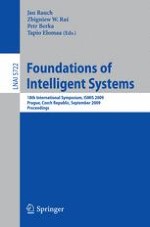2009 | OriginalPaper | Buchkapitel
Intelligent Systems: From R.U.R. to ISMIS 2009 and beyond
verfasst von : Maria Zemankova
Erschienen in: Foundations of Intelligent Systems
Verlag: Springer Berlin Heidelberg
Aktivieren Sie unsere intelligente Suche, um passende Fachinhalte oder Patente zu finden.
Wählen Sie Textabschnitte aus um mit Künstlicher Intelligenz passenden Patente zu finden. powered by
Markieren Sie Textabschnitte, um KI-gestützt weitere passende Inhalte zu finden. powered by
History of humans trying to understand and provide foundations for human reasoning or intelligence can be traced back to 11
th
century BC Babylonia reasoning in medical diagnostics and astronomy, Chinese tradition of thought that blossomed between 10
th
and 6
th
centuries BC and produced Analects of Confucius, 6
th
through 2
nd
century BC Indian philosophy and Hindu schools of thought, 4
th
century BC Greece where Aristotle gave birth to formal logic, and the quest continues into 21
st
century AD.
Humans have also been keen on creating “artificial life” or “intelligent systems”. The Old Testament that was created between the 12
th
and the 2
nd
century BC mentions a “servant” made from clay called Golem. However, you are now in Prague, where according to the legend the 16
th
century the chief Rabbi Loew constructed the Golem out of clay from the banks of Vltava (Moldau) river and brought it to life to protect the Jewish Ghetto. However, Golem grew it became increasingly violent, spreading fear, killing and eventually turning on its creator. It is believed that the first record of a “homunculus” (representation of a human being) appeared in alchemical literature in the 3
rd
century AD. A different branch of inquiry aimed at building “automata”, or self-operating artificial systems that have been made to resemble human or animal actions. These can be traced to 3
rd
century BC China, Greek Antikythera mechanism built about 150-100 BC, 8
th
century Muslim alchemist, Jabir ibn Hayyan (Geber) who in his coded Book of Stones included recipes for constructing artificial snakes, scorpions, and humans.
In 1921, a Czech writer Karel Capek gave birth to the word “robot” in his science fiction play “R.U.R.” (Rossum’s Universal Robots). Today, robots produce cars, explore the universe, search for victims in natural disasters, perform delicate surgeries, harvest crops, and cuddly robots with capabilities to talk are companions to elderly and children - as portrayed in another Czech science fiction from 1962 “Kybernetická Babicka” (Cybernetic Grandmother) by Jirí Trnka - a puppet maker, illustrator, motion-picture animator and film director.
The quest to understand intelligence and create intelligent systems has a history of 32 centuries, while the International Symposium on Methodologies for Intelligent System that originated in 1986 has as of this year (2009) devoted 23 years to advancing the state of the art in our understanding intelligent behavior - both human and machine, and developing more effective intelligent machine systems or human-machine systems.
In the early years, ISMIS focused on areas of Approximate Reasoning, Expert Systems, Intelligent Databases, Knowledge Representation, Learning and Adaptive Systems, Logic for Artificial Intelligence, and Man-Machine Interaction. ISMIS 2009 called for papers in the areas of Active Media Human-Computer Interaction, Autonomic and Evolutionary Computation, Digital Libraries, Intelligent Agent Technology, Intelligent Information Retrieval, Intelligent Information Systems, Intelligent Language Processing, Knowledge Representation and Integration, Knowledge Discovery and Data Mining, Knowledge Visualization, Logic for Artificial Intelligence, Music Information Retrieval, Soft Computing, Text Mining, Web Intelligence, Web Mining, and Web Services.
Have we solved the problems that are not in ISIMS 2009 focus? Where do we stand? What have we learned? What are we teaching? Where should we focus our attention in the years beyond 2009? This talk will outline open research problems, educational and other societal issues, and opportunities for cooperation in methodologies for intelligent systems.
